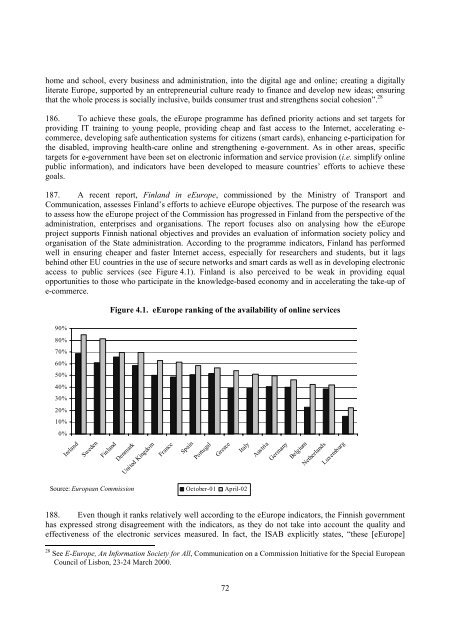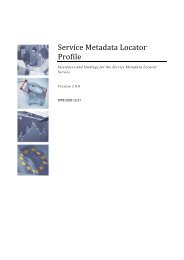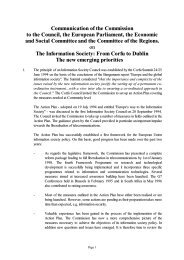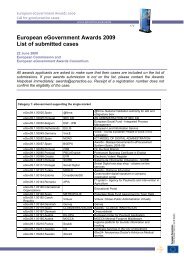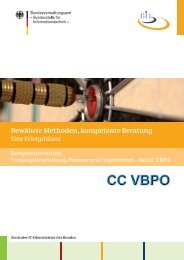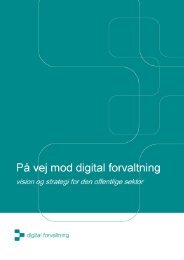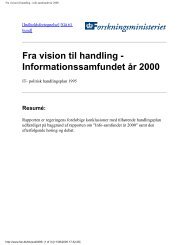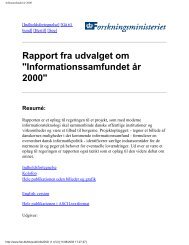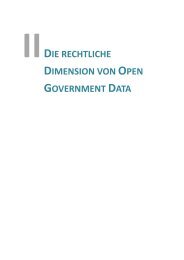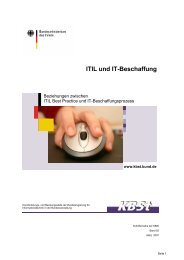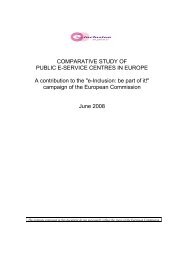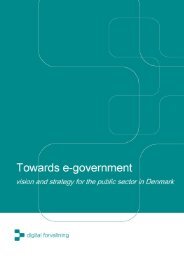e-GOVERNMENT IN FINLAND - ePractice.eu
e-GOVERNMENT IN FINLAND - ePractice.eu
e-GOVERNMENT IN FINLAND - ePractice.eu
Create successful ePaper yourself
Turn your PDF publications into a flip-book with our unique Google optimized e-Paper software.
home and school, every business and administration, into the digital age and online; creating a digitally<br />
literate Europe, supported by an entrepren<strong>eu</strong>rial culture ready to finance and develop new ideas; ensuring<br />
that the whole process is socially inclusive, builds consumer trust and strengthens social cohesion”. 28<br />
186. To achieve these goals, the eEurope programme has defined priority actions and set targets for<br />
providing IT training to young people, providing cheap and fast access to the Internet, accelerating ecommerce,<br />
developing safe authentication systems for citizens (smart cards), enhancing e-participation for<br />
the disabled, improving health-care online and strengthening e-government. As in other areas, specific<br />
targets for e-government have been set on electronic information and service provision (i.e. simplify online<br />
public information), and indicators have been developed to measure countries’ efforts to achieve these<br />
goals.<br />
187. A recent report, Finland in eEurope, commissioned by the Ministry of Transport and<br />
Communication, assesses Finland’s efforts to achieve eEurope objectives. The purpose of the research was<br />
to assess how the eEurope project of the Commission has progressed in Finland from the perspective of the<br />
administration, enterprises and organisations. The report focuses also on analysing how the eEurope<br />
project supports Finnish national objectives and provides an evaluation of information society policy and<br />
organisation of the State administration. According to the programme indicators, Finland has performed<br />
well in ensuring cheaper and faster Internet access, especially for researchers and students, but it lags<br />
behind other EU countries in the use of secure networks and smart cards as well as in developing electronic<br />
access to public services (see Figure 4.1). Finland is also perceived to be weak in providing equal<br />
opportunities to those who participate in the knowledge-based economy and in accelerating the take-up of<br />
e-commerce.<br />
90%<br />
80%<br />
70%<br />
60%<br />
50%<br />
40%<br />
30%<br />
20%<br />
10%<br />
0%<br />
Ireland<br />
Sweden<br />
Figure 4.1. eEurope ranking of the availability of online services<br />
Finland<br />
Denmark<br />
Source: European Commission<br />
United Kingdom<br />
France<br />
Spain<br />
Portugal<br />
Greece<br />
72<br />
Italy<br />
October-01 April-02<br />
Austria<br />
Germany<br />
Belgium<br />
Netherlands<br />
Luxemburg<br />
188. Even though it ranks relatively well according to the eEurope indicators, the Finnish government<br />
has expressed strong disagreement with the indicators, as they do not take into account the quality and<br />
effectiveness of the electronic services measured. In fact, the ISAB explicitly states, “these [eEurope]<br />
28<br />
See E-Europe, An Information Society for All, Communication on a Commission Initiative for the Special European<br />
Council of Lisbon, 23-24 March 2000.


